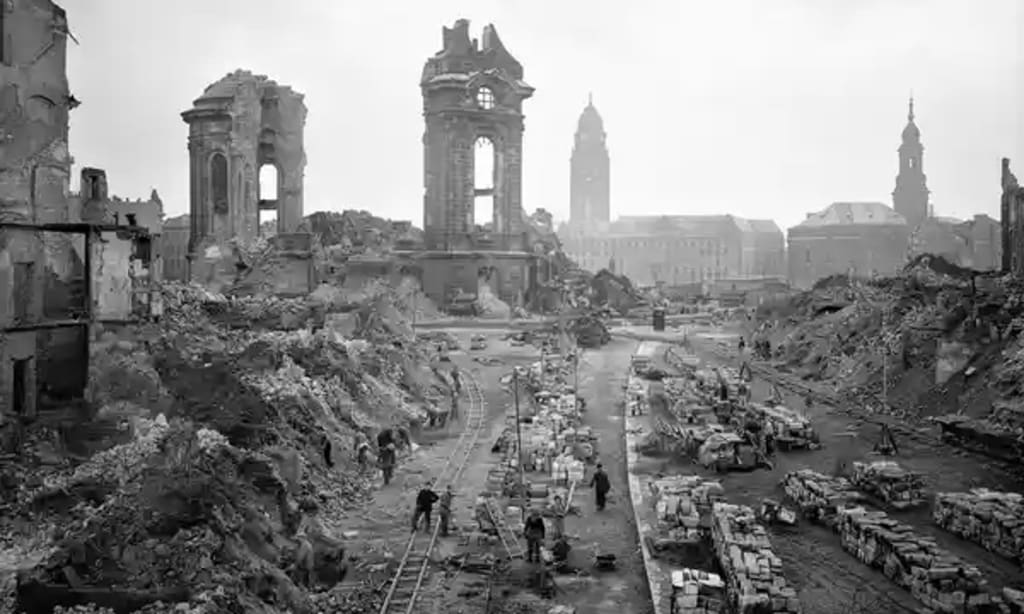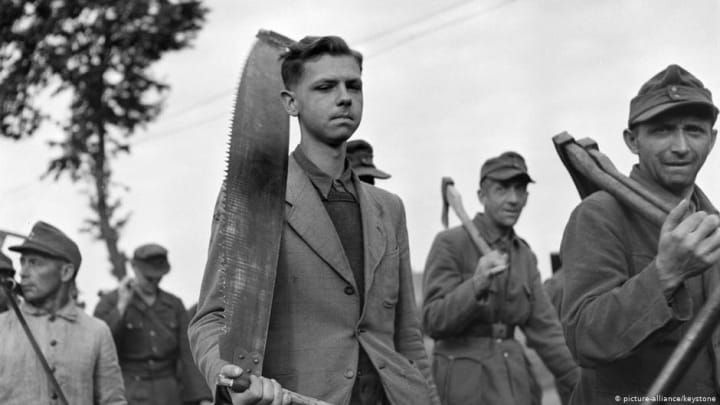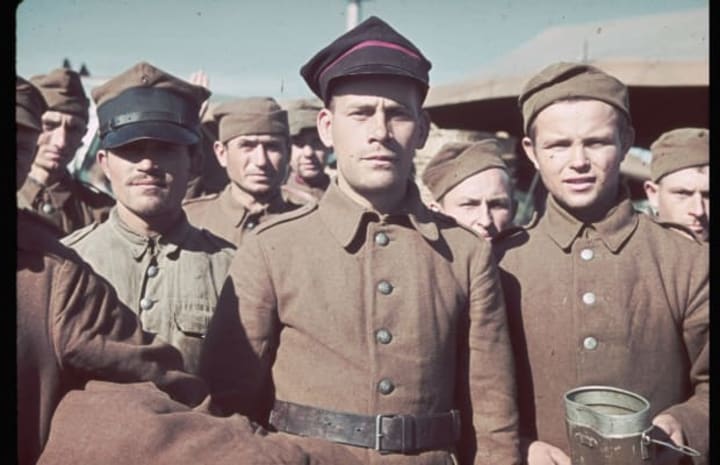Never Is Too Late
Grieving and forgiving the past is hard for us to do from any side of an imaginable loss.

I always believed my great grandfather was a proud man, devoted to family and country, and who stood against the vile Nazi army, and the evil that was sweeping across Eastern Europe.
His family's high social status and financial standing allowed him to remain a German officer, yet far from the front lines.
I remember hearing his sons tell our family about the times of “Opapau’s” service in trying to rebuild the country after the cessation was signed.
There were thousands of pictures of him with Jewish survivors that he had met throughout his life as a civilian.
One woman was very attractive and I often wondered why my great grandfather, a handsome and charismatic man had not chosen to settle down with a woman who by all accounts had survived some of the most horrifying and harrowing times in our history.
My great grandmother however, was a natural beauty, born and raised in Hamburg, Germany. She carried on the bloodline with two boys who had grown into respected and humble men themselves. They didn't pursue the mantle of civil service as Opapau did. They were raised in a quiet farming community outside Vienna.
They had cows, chickens, roosters, a few pigs, and lots of rabbits. The boys helped raise all of the animals, and would deliver whatever they had that was extra to town, often giving it away to anyone who would take it.
Rarely was there anyone who said anything about my Opapau being a German Officer during that time.
I asked grandpa Gregor, the youngest of the two brothers, about the turbulent times after peace was enlisted - his response was simple, but curious, "My sweet tender child, our father, your Opapau - Herzog-Gunther Weissman, had been forgiven a thousand times, he was always trying to help the people, all people, because he understood what they had been through. But his life was a tormented one, because he wasn't free from the suffering in the least. We loved him deeply as our father. There are some things that could never be forgiven, and I pray you never have to know them child."
I had heard that when I was young - too young to have the inclination to seek out more information. But I was just as curious as the answer I received.
While finishing post-graduate work, I was approached by an older man who said he knew my grandfathers. He had been trying to find them before they had passed away.
He was sorry he couldn't pay his respects but he was still very interested in speaking with any of their relatives.
My eyes widened as I quickly found a place for us to continue our conversation more comfortably.
We found a little bistro and were there at least an hour after they closed. I was so fascinated by his stories I offered a few extra notes to the owner who knew me from all the late nights I was usually there.
I was raised to respect my elders, and there was no greater person of respect than someone who knew your ancestors - this was often our family's tradition to share the stories of friends that had gone on, with they familial loved ones they left behind.
What I heard changed everything I had accepted as my family's heritage and prestige.
I knew my great grandfather had been German Officer. I knew that he had come from a prominent German family affording a certain amount of leverage within the ranks of the army.
I knew nothing of his involvement with Nazis.
We as a family condemned them and their atrocities long before I was born.
Opapau was part of the rebuilding and restoration of Jewish-German neighborhoods and factories that had been overrun or raised as a tactic to intimidate or coerce people into leaving their homes or contributing to the war effort, either with their wealth or their lives.
The older man thanked me, and apologized for the gravity of the information he had given me.
But I had to consider the truth of what I had heard.
It was again, impossible to get any information about him. When I found a lead that was close to classified details about German or Nazi officers, I was told officially to cease. I even received a letter declaring the information restricted. Further inquiries would be considered an intrusion and punishable by law.
I believed that I would never know the man so many people had - as a benevolent man of high moral pursuit, who had spent his post-war life serving and being of service to others who may have been descendants of victims that he may have known.
I always believed that he was forced to fight, or at least hold an officer's rank.

There was conflict in his actions, I thought. He was "A German war officer who used his position to fight the Nazi regime from within."
He was not the honorable, resolute, defiant officer we honored from generation to generation.
We never imagined him unwitting and innocent, and although it was war, as the preservers of his memory, we held a level of respect for history.
I told Mr. Werner Hellman, the gentle old man, about Opapau’s journals he kept while he was an officer. Mr. Hellman asked about a specific one, a small black book with the initials “HVG” on it.
I told him I had never seen it before. I lied, I was still preserving my great grandfather’s wretched legacy.
But I had seen it once, when I was a boy. My mother kept it in her bedside table and before I could color it’s pages, she carefully pulled it away from me.
When Mr. Hellman mentioned it, I was already thinking of its significance, and its malice.
Before meeting with Mr. Hellman the next time, I decided to bring the little black book.
He looked much better and there was another younger looking man with him.
As I approached the bistro, I noticed he looked much better and there was a younger looking man with him.
They both stood to greet me and shake my hand.
Mr. Hellman introduced the new member at our table, Douglas Smith Tyson a journalist and reporter for a prominent British newspaper.
Mr. Tyson had been compiling information for a story about the unit my great grandfather had been a part of and Mr. Hellman had been working with him.
They had documents and some archival interviews from individuals and survivors.
Mr. Hellman shared some stories that were corroborated by Mr. Tyson’s research.
I was certainly uneasy about wheat I was hearing.
Mr Hellman had not mentioned any of this. I presumed he was more of a friend than a liaison.
Mr. Hellman’s eyes started to well up with tears in the telling of one account where his great grandfather was taken from his family by my Opapau.
The two men were friends, but Mr. Hellman’s great grandfather refused to go quietly.
He fought.
He was made an example for the other affluent Jewish families.
I looked at Mr. Hellman to apologize and console him, but he just told me he was fine, it was just the second time he heard him tell this story of him great grandfather.
I stood up from my chair and embraced this gentle old man whom I barely knew, but felt so connected and responsible for.
We continued to share our stories of what we all knew about our great grandparents.
What I knew to be factual and accurate, was his life after the war.
I was misguided in this as well.
My great grandfather lied about his involvement.
Though he lamented being a German officer, he was tacit and deceptive about his close and unenviable ties to the SS, and the killing of men that he grew up with.
He was a conspirator and a coward.
I was devastated and ashamed.
But Mr. Hellman wouldn’t let me fall into guilt and shame.
He just kept smiling at me.
We continued our lunch and coffee into the evening and bottles of wine.
Mr. Tyson finally had to excuse himself, as he had another appointment that needed his attention. I asked him for a moment before he left, and I excused us both, as Mr. Hellman continued to drink his coffee.

The burly Mr. Tyson thanked me for my time and candor, and I couldn’t help but to reach my arms wide around him and start to weep.
He embraced me, and we held each other for a moment before taking a step back to regain a bit of brevity.
I asked him if he helped Mr. Hellman, he was dressed very well and looked much more distinguished than when we first met.
Mr. Tyson said that his editors allowed some provisional funds for the research. He also provided some personal funds for some of Mr. Hellman’s personal expenses.
“It is just a little something I could do, it is not much, but I really felt there was something that maybe, might could be helpful.”
I wanted to help Mr. Hellman as well.
“Mr. Tyson, I have a journal, my great grandfather’s journal. I have never opened it, but Mr. Hellman knew of its existence, and believes it may contain some information to help understand some of this. Would you consider it consignment to help Mr. Hellman?”
“We don’t usually buy items like this without having it inspected and verified for authenticity. I would need to acquire the journal and have the authority to have it authenticated.”
I reached into my jacket and removed the black, leather bound notebook from inside.
I glanced at it and solemnly handed it to Mr. Tyson. He accepted it and felt the years upon its cover.
His fingertips ran over the soft worn grooves of the initials.
“HGV?”
The initials were my great grandfather’s but he used his mother’s name on his identification and enlistment paperwork.
“Viessman.”
I nodded ‘yes’ and returned to our table. The waitress had just freshened our coffees, and she brought some freshly baked danish.
As I sat down, I noticed Mr. Tyson had entered a phone booth, and was feverishly adding coins, and pressing the numbers.
Mr. Hellman sat his cup down and reached for my hand with both of his.
He grabbed my attention from Mr. Tyson, and I looked down at the time written on his hands and wrists, the pain wrapped years in the small, defiant circles around his eyes.
“Thank you, young sir, you are a kind and generous young man, and I am so very fortunate and happy to have met you.”
I smiled back at him and held his hands as he continued speaking through the approaching sobbing.
“Please forgive my misleading, there have been some people much less forgiving of the past, and would rather keep it buried with their loved ones.”
I nodded, and weeped.
Mr. Tyson bursted in full of excitement.
He couldn’t raise our spirits any higher in that moment, but he proceeded to announce his news anyway.
“My editor is willing to offer a conditional bonus to you Mr. Hellman, on the consignment Mr. Weissman has offered on your behalf.”
Mr. Hellman saw the notebook and looked at me.
“You had it, my boy?!”
His eyes started to fill with tears again.
Mr. Tyson opened a small tablet with a shiny black cover, and carefully pulled a slip of paper out.
“Please, please don’t start that again, I’ll smear the ink on this check, and it’s my last one!”
He laid down a business check written out and addressed to Mr. Hellman for $20,000!
Mr. Hellman started to laugh and cry and he stood up to embrace the large Mr. Tyson like he was a long lost son, and then reached over and pulled me into his outstretched arms.
Mr. Tyson nodded.
“Jolly good, young man, jolly good!”
About the Creator
Jason-Matory Bailey
My name is Jason-Matory Bailey; my name “Jason” means healing in Hebrew
Writing is healing for me, healing for my mind and soul
Narrating my truth, finding myself, and examining the essence of how I fit into the construct of this experiment






Comments
There are no comments for this story
Be the first to respond and start the conversation.